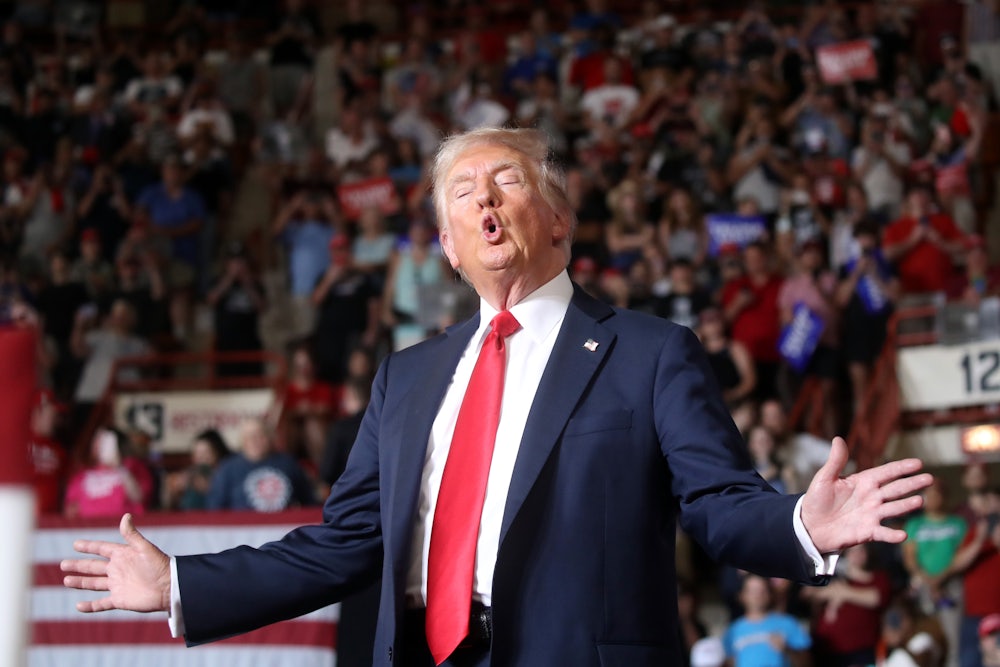It’s one of the biggest unknowns about Kamala Harris’s presidential candidacy: Will she successfully reconstitute the Democratic coalition amid Donald Trump’s surprising, persistent strength among nonwhite voters, particularly Latinos, and young people? The case for optimism among Democrats has been that Trump’s support among these groups is very soft—inflated by factors like inflation and President Biden’s deep unpopularity—rendering them ripe for recapture.
Now a new poll—apparently the first large-sample poll of Latinos since Harris became presumptive Democratic nominee—provides fresh grounds for that optimism. It finds that Harris holds a nearly 20-point lead over Donald Trump among Hispanics in the battleground states, a surprisingly large expansion of Biden’s ailing support among them—and that her candidacy has room to grow that lead, suggesting she may be putting back in play Sun Belt states that appeared lost under Biden.
Harris leads Trump by 55 percent to 37 percent in the head-to-head finding, which sampled 800 Latinos across Arizona, Nevada, Pennsylvania, Michigan, Wisconsin, Georgia, and North Carolina. The survey—provided to The New Republic in advance of its release on Monday—was conducted July 23–26, well after Biden stepped aside on July 21.
The poll dovetails with other national polls finding similar advantages for Harris among Latino voters. But, significantly, the larger Latino sample size in the survey—commissioned by the voter engagement group Somos PAC and conducted by Latino pollster Gary Segura—provides a stronger basis for confidence that Harris’s lead among Hispanics is real.
“Harris enters as the nominee with a very strong lead among Latinos,” says Segura, whose firm BSP Research did the poll (Segura’s business partner, Matt Barreto, polls separately for the Harris campaign). “We focused only on the battlegrounds, with a large enough sample in them to arrive at a confident estimate of the two-party vote in the states that will actually decide the election—not in states where the outcome is already determined, like Texas and California.”
Harris’s 55 percent support among Latinos still falls a bit short of Biden’s support among them in 2020, which hovered at around 60 percent. But Harris’s support is substantially higher than Biden’s was in recent days; in some polls, Trump had pulled close to or even ahead of him among Latinos. Harris may be erasing that dynamic—even though she just entered the race and has more time to introduce herself to them.
What’s more, Trump is viewed favorably by only 39 percent of Latinos, suggesting Harris has room to expand support from them. “Harris has strengthened and consolidated support,” Melissa Morales, president and founder of Somos PAC, told me, adding that Trump has “very low favorability within the Latino community. The more we remind them who Trump actually is, the more we expect that to go down.”
Neither of the Democrats’ two leading vice presidential hopefuls has a substantial advantage over the other among Latinos in the poll. Pennsylvania Governor Josh Shapiro is viewed favorably by 31 percent and unfavorably by 17 percent. For Arizona Senator Mark Kelly, those numbers are 33 percent and 20 percent. (Minnesota Governor Tim Walz, a surprise contender, was not tested.) Large percentages of Latinos have no opinion of Shapiro or Kelly.
The poll also suggests an opportunity to reverse the widely lamented drift of young nonwhites away from Democrats. Harris is viewed positively by Latino men who are 29 and under by 21 points (55–34), and by young Latina women by 47 points (70–23). The poll also shows why Harris may put the Sun Belt back in play: She is viewed positively by Latinos overall in Nevada by 44 points (69–25) and in Arizona by 14 points (54–40).
Among Latinos overall, 34 percent are more excited to vote Democratic now that Harris is running, versus only 10 percent who are less excited. Separately, when Robert F. Kennedy Jr. and other third-party candidates are included in questioning, Harris leads Trump by 46–31, mirroring other polls.
The poll also challenges certain media narratives about this race. It has often been said that inflation and the economy are what enabled Trump’s economic “populism” to cut deeply into Biden’s Latino support. The poll does find that 63 percent of Latinos view the cost of living and inflation as their top issue—vindicating arguments that the economy now far outpaces immigration in that regard.
But Harris’s nearly 20-point lead over Trump among Latinos despite these inflation concerns raises questions about how much those worries directly benefit him. And crucially, the poll also finds that 60 percent of Latinos agree with a progressive populist Harris message that stresses Trump’s tax cuts for the rich as president and his favoritism toward the wealthy and corporations, along with Harris’s promises to raise their taxes and hold corporations accountable for price gouging.
It’s also sometimes said that Trump’s restrictionist immigration policies and promises of mass deportations actually appeal to Latino voters who have settled in the United States and oppose undocumented migration under Biden. But in the poll, a message pairing increased border security with a path to legalization for various groups of undocumented immigrants living here—which Harris favors and Trump opposes—leads 65 percent of Latinos to view Harris more favorably. Messages about her status as the daughter of immigrants have very wide appeal among them.
“We will be making sure that these get out to Latino voters,” Morales said. “This poll shows there’s room for growth within the Latino coalition as well, once they are introduced to these messages. Her biography is very powerful.”
When Biden was running, some Democrats argued that Trump’s lead largely reflected inflated gains among nonwhites and young voters—and that the softness of his support among those groups paradoxically constituted a long-term weakness for him. Presuming this new poll is right and its findings are borne out in coming weeks, that weakness is starting to look real—and Harris appears well positioned to exploit it.










